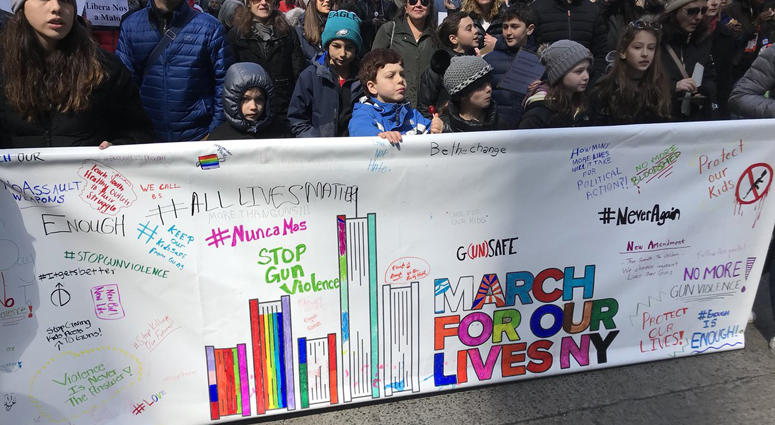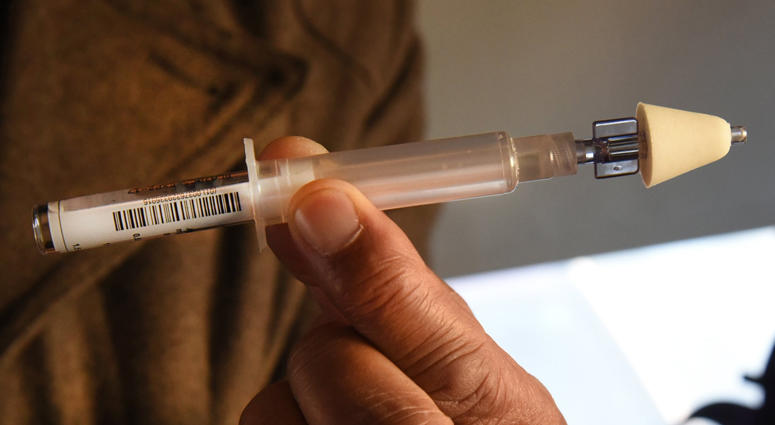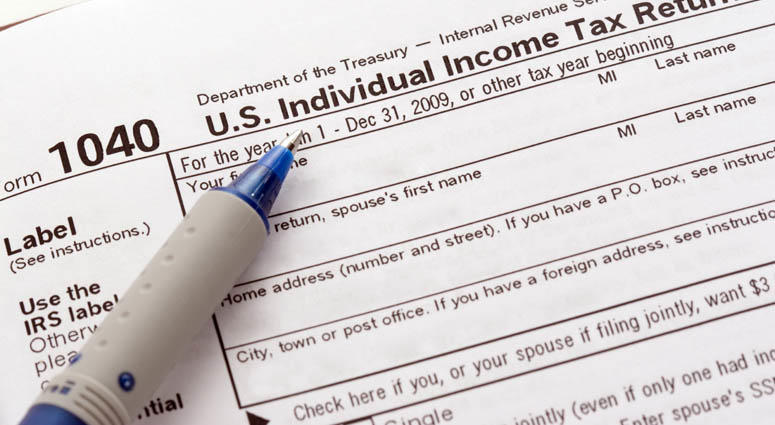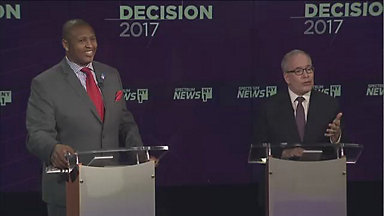
-
March For Our Lives: In Sound
Post Views: 1,258NEW YORK (WCBS 880) — Hundreds of thousands gathered across the country to demand gun reform.
Listen back to our coverage of the March for Our Lives Rally in Washington, D.C. and here at home:
CBS Correspondent Bill Rehkopf reports from Washington, D.C. where Parkland survivors take the stage and speak out on gun reform:
CBS Correspondent Bill Rehkopf reports on the March For Our Lives in Washington, D.C., where thousands gathered against gun violence:
WCBS Reporter John Metaxas walks alongside crowds of demonstrators who are calling for gun reform at New York City’s March For Our Lives:
WCBS Reporter Ethan Harp speaks with the organizer of New York City’s March For Our Lives:
WCBS Reporter Ethan Harp listens to Governor Cuomo speak on gun reform at New York City’s March For Our Lives:
CBS Correspondent Bill Rehkopf reports from Washington, D.C. where the March For Our Lives has brought massive crowds calling for an end to gun violence:
CBS Correspondent Don Dahler talks gun laws, the possibilty for reform and the place of the Second Amendment in history:
WCBS Reporter Ethan Harp covers New York City’s March For Our Lives where student protesters are calling for gun control following the Parkland massacre:
WCBS Reporter Ethan Harp meets demonstrators at New York City’s March For Our Lives on Saturday, March 24:
CBS Correspondent Bill Rehkopf reports from Washington, D.C. where the protesters are demanding gun control at the March For Our Lives:
WCBS Reporter Ethan Harp speaks to Long Island high schoolers who are rallying for gun reform at New York City’s March For Our Lives on Satuday, March 24th:
Rep. Peter King (R-NY) joins WCBS Newsradio 880 Anchor Cheryl Simone live as “March for Our Lives” protesters gather around the nation to call for gun control measures. Congressman King says it shouldn’t be a Democrat vs. Republican issue or a “gun or anti-gun issue.”
Neil A. Carousso produced WCBS Newsradio 880’s breaking news coverage of the nationwide “March for Our Lives” protest on Saturday, March 24, 2018. All live interviews and content were produced, written and booked by Neil A. Carousso.
-
NYC Steps Up Fight Against Opioid Crisis
Post Views: 1,297NEW YORK (WCBS 880) — This week, Mayor Bill de Blasio announced $22 million more will go to fight opioid overdoses in New York City.
That brings total funding for the HealingNYC program, which was estabished last March, to $60 million.
“We are expanding things that are working and we are also adding some new interventions,” New York City Health and Human Services Deputy Mayor Dr. Herminia Palacio tells WCBS Newsradio 880 Producer Neil A. Carousso. “This is a complex problem and as we learn things we’re adding things to help address it.”
City officials say more New Yorkers die from drug overdoses than suicides, homicides and car crashes combined.
Palacio says HealingNYC aims to reduce opioid overdose deaths 35 percent by 2022.
“We’re starting to see a flattening across the city, from 2015 to 2016 we saw a very rapid increase in the number of opioid deaths by about 50 percent — this increase was largely related to the rapid introduction of fentanyl into the drug supply system and after we initiated HealingNYC we’re very optimistic that we’ve seen a flattening,” Palacio said. “The increase from 2016 to 2017 was only about 5 percent so we still have much, much work to do but we are hopeful that some of our work is really starting to get some traction.”
The next step is more access to naloxone, the life-saving drug that opens receptors in the brain that close when someone uses a drug like heroin. People stop breathing when the brain’s receptors close.
The city Health Department is visiting independent pharmacies throughout the five boroughs over the next month to encourage them to offer naloxone, also known as narcan.
“We have already distributed 100,000 naloxone kits through HealingNYC,” Palacio said. “We have good partnerships with many of the chain pharmacies but in New York City, especially in the boroughs, there’s many independent pharmacies that are still very vibrant parts of the communitiy and through this next initiative the Department of Health is working with approximately 800 independent pharmacies to make sure that they’re aware of the commissioner’s order to make sure that they feel comfortable giving naloxone to people who seek it without a prescription.”
Palacio says the goal of this HealingNYC initiative is to put the life-saving drug in the hands of regular people who can save a life before medics can get to the person.
“So that people can protect themselves, protect their friends, protect their family members. We can’t get you to treatment if you suffered a fatal overdose,” Palacio said. “So this is really about saving a life.”
Individuals seeking support or treatment for themselves or their loved ones can contact NYC Well by calling 1-888-NYC-WELL, texting “WELL” to 65173 or going to nyc.gov/nycwell.
-
Scams To Watch Out For This Tax Season
Post Views: 1,424NEW YORK (WCBS 880) — The IRS has released its updated 2018 list of the top 12 or “dirty dozen” tax scams.
Will Cheung, assistant special agent at the Internal Revenue Service New York Field Office, recently told WCBS Newsradio 880 Producer Neil A. Carousso how to protect your personal information when it has become increasingly difficult.
‘Dirty Dozen’ List Of Tax Scams For 2018
Among the scams to watch out for this year are phone scams, phishing schemes, identity theft, fake charities, and false income.
Phone scams are especially common, with people getting calls from someone purporting to represent the IRS and sometimes threatening taxpayers with police arrest, deportation, or license revocation.
“The thing is we do call people, but we will never threaten somebody, and we will never demand payment. So how these scams work is you get an unsolicited call from a person purporting to be an IRS official, and they demand money, and they want you to pay them right away, and they have this sense of urgency to get you to pay,” Cheung said.
Cheung noted that the first attempt to contact someone will be by postal mail.
“Our first contact will usually be by IRS notice, so it will be sent to your mailing address that you have on file with the IRS,” he said.
If people have mistakes on their returns, they should call the IRS themselves rather than taking a call from someone claiming to represent the organization. Scammers can even manipulate phone numbers on caller ID to make it appear as if the call is from the IRS – a practice called spoofing.
“A lot of these scammers are very tech savvy, so they’re able to do this, and to make it look like it’s really coming from the IRS,” Cheung said. “But again, be wary of these phone calls that you get. I mean, most people know, but you know, even though most people know, there are a percentage of people who don’t know. For example, since October 2013, there’s been 12,716 victims that paid over $63 million as a result of these scams.”
Another common scam involves people posing as charities and taking advantage of the fact that people might want a tax deduction based on giving to a charity. Cheung reminds the public never to give out personal information – especially over the phone.
“There is a list of charities that we recognize. I would say it’s probably a good practice not to give donations to somebody who calls you over the phone. I mean, there may be charities that are going to solicit you over the phone, but I would not give it over to them over the phone,” Cheung said. “I mean, if you are interested in donating to that charity, so, the first thing you should do is probably look them up and see if they are an official 501(c)(3) charity.”
At that point, anyone who wants to donate is advised to do so through the charity’s website rather than over the phone, he said.
“There’s too many people trying to take advantage of maybe, like, the elderly, or somebody who wants to do the right thing, but over the phone, it’s just too common right now,” Cheung said, “so I wouldn’t do it over the phone.”
Meanwhile, identity theft is one of the fastest-growing crimes in the U.S., and the IRS says it has made significant progress combating tax return identity theft. But the problem remains severe enough to watch out for.
“Right now, because there’s so much information out there and there’s so many data breaches, people are selling your information – like your Social Security number – on the dark web,” Cheung said. “So people can get your Social Security number and file a tax return, and they would often do it early in the filing season. So when you actually go to file your actual return, that’s when you find out somebody already filed a return in your name when your return gets rejected, because there’s already been a return filed.”
Cheung said such identity theft practices remain a major problem at the IRS, but it is not as big of a problem as it was back in 2015, when there were 677,000 reports of identity theft. In 2016, it went down to 400,000, and in 2017, it dropped to 242,000.
“But that’s still affecting a lot of people, so my advice is really, you have to be careful how you store your personal information,” Cheung said.
He advised that people should carry their Social Security cards in their wallets, and should treat their Social Security numbers as if they were cash.
“That’s exactly what it is for somebody who gets their hands on your Social Security number, because they could sell it for cash, and they could try to open credit cards under your name. They could file a tax return under your name and get as refund,” he said.
Cheung said people also need to recognize phishing emails when they come in.
“If you get an email, and you don’t know where that email is coming from, don’t click on any attachments or click on the links,” Cheung said. “You should just delete that email.”
Cheung said identity thieves can wreak havoc in particular if they get their hands on a Social Security number and a date of birth.
“I think people have to realize certain information is very valuable to the criminal, and one of the most important pieces of information that you should keep secure is your Social Security number and your date of birth,” he said. “If they get those two items, they have so much information on you, and they can go through social media. So let’s say you like to post on social media. They could get your address where you’re posting from; where you like to visit. So you know, I would just be careful mainly with those two items – your Social Security number and your date of birth.”
Cheung advised that people should look at their credit reports, which everyone is allowed to do annually for free. If someone does become the victim of identity theft, Cheung advised that people should notify the Federal Trade Commission at identitytheft.gov, set up a fraud alert with the credit bureaus, and contact financial institutions to close any fraudulent accounts.
Those who have a tax return fraudulently filed in their name might get an IRS notice, and still must respond to it.
“You can call the number that’s provided in that notice, and then the IRS has a form 14039 – it’s an identity theft affidavit,” he said.
If someone has already had a tax return fraudulently filed in their name and their real return gets reject, Cheung advised that even though the victim cannot file electronically again, they can still file a paper return and attach the identity theft affidavit.
Cheung also weighed in on tax preparation. A couple of years ago, the IRS reported that 90 percent of taxpayers seek help in preparing their returns, and the tax law has become more complicated since then.
“I don’t know the numbers, but I know a lot of people do rely on a tax preparer to prepare their tax returns, because they don’t understand everything that they need to do, and they want to make sure they have a professional help them,” he said. “There’s also tax software, a lot of people do that… tax software will ask you all these questions, and I know they’ve been advertising on television how easy it is to use the tax software.”
For those specifically looking for a return preparer, Cheung had some advice.
“I would say avoid those fly-by-night preparers, like a preparer that just popped up and he’s just preparing for the first time, because they might not be there next year in case you get audited. They won’t be there to help you,” Cheung said. “You should also avoid preparers who are going to guarantee that they could give you a larger refund than other preparers, because basically, if your tax returns are prepared correctly, any preparer should arrive at a very similar number.”
Also to be avoided are preparers who charge a fee based on the amount of the refund the taxpayer will receive, Cheung said.
Preparers should also be asked if they have an IRS tax identification number, and should sign and identify themselves as preparers, Cheung said.
When a taxpayer receives a return back from a preparer, they should check their names, Social Security numbers, and all the other information, “because ultimately, if there is false identification on that tax return, you are going to be responsible for it.”
-
Low Voter Turnout Expected in New York, Virtual Democrat Monopoly
Post Views: 1,438By Neil A. Carousso
It’s Election Day, but you may not be aware.
Voting turnout in the 2013 New York City election was a record low 23 percent. A mere 14 percent of voters showed up for the September primary.
NYC VOTES: TERRORISM AND TRANSPORTATION AMONG IMPORTANT ISSUES FOR VOTERS, CANIDATES
Compound this with Comptroller Scott M. Stringer’s recent audit showing problems at 90 percent of 156 polling sites examined.
“What we found was just outrageous,” Comptroller Stringer said, citing, “People turned away at the polls, poll workers not realizing how they can get people to vote, ballots were voided.”
Throughout New York State, only about 15 races of 213 legislative seats are competitive in any given year. Comptroller Stringer aims to increase voter participation.
Republicans do not hold any seats in Manhattan. Besides Staten Island and parts of the State, one party holds a virtual monopoly of each district.
The polls in New York City are open until 9 PM.
NYC COMPTROLLER STRINGER AND CANDIDATE REV. FAULKNER VIE FOR CFO JOB
Featured Image: New York Daily News Photo.
-
NYC Comptroller Stringer and Candidate Rev. Faulkner Vie for CFO Job
Post Views: 1,934By Neil A. Carousso
In two separate sit-down interviews, New York City Comptroller Scott Stringer (D) and his Republican challenger Rev. Michel Faulkner discussed their ideas for improving the City’s transit delays, how to work with the Trump Administration and prevent the loss of federal funding for the New York Police Department, among other issues.
Rev. Faulkner is a retired NFL Player who worked on former Mayor Rudy Giuliani’s community policing task force. Now, Rev. Faulkner is running opposite Incumbent Comptroller Stringer.New Yorkers vote for City comptroller on the ballot on Tuesday. The polls in the Big Apple close at 9 PM local time.
Featured Image: Comptroller Scott M. Stringer and Rev. Michel Faulkner debate on Spectrum News NY1 in October.
Top News
Social Feeds

VIDEO: Told the airline to book us on the next flight out (SPONTANEOUS TRIP!)

VIDEO: The Taylor Swift Effect | WCBS Business Breakfast

VIDEO: Future of NYC | WCBS Business Breakfast

VIDEO: Reasons for New Yorkers to be Optimistic | WCBS Business Breakfast

VIDEO: NYC's AI Chatbot | WCBS Business Breakfast






